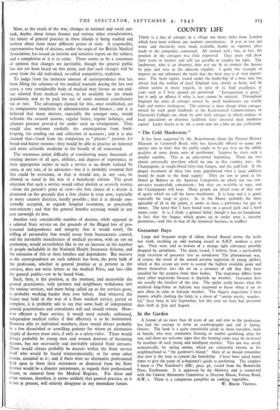COUNTRY LIFE
THERE is a line of cottages in a village not thirty miles from London which have been without any modern conveniences. A year or two ago water and electricity were made available, thanks to vigorous pleas made to the companies concerned. All seemed well ; but, in fact, the position of the cottagers was little improved. They must still draw their water in buckets and still use paraffin or candles for light. The landowner, who is an absentee, does nat see fit to connect the houses by pipe and wire to the adjacent supplies. I quote this example to impress on our reformers the truth that the final step is of vital import- ance. The Scott report, issued under the leadership of a man who has always had the welfare of rural England very closely at heart, will be almost useless in many regards, in spite of its high excellence, if cases such as I have quoted are permitted. " Juxtaposition is great," but is only an offence if what is near cannot be enjoyed. Throughout England the rents of cottages owned by small landowners are cruelly high and repairs inadequate. The contrast is most abrupt when cottages owned by such good landlords as the Ecclesiastical Commissioners or University Colleges are cheek by jowl with cottages in which widows or local speculators or absentee landlords have invested their moderate capital. Leaky shacks at 6s. 6d. a week rent are a blot on our civilisation.
4, The Cold Mushroom " It has been suggested by Mr. Ramsbottom (from the Natural History Museum in Cromwell Road, who has heroically offered to name any species sent to him) that the public ought to be put wise on the edible qualities of some dozen sorts of mushroom. Suppose he starts with a smaller number. This as an educational beginning. There are two almost universally prevalent which no one in this country eats: the Champignon, or tough-fibred fairy-ring fungus, and the puff-ball. If the proper treatment of these two were popularised what a large addition would be made to the food supply! They are not so good as the Morel or Boletus or the Agaricus Campestris on which our too con- servative countryfolk concentrate ; but they are available in tons, and the Champignon will keep. Many people are afraid even of that sort of agaric which we call the horse mushroom. It is large and it is good, especially for soup or gravy. As to the Morel, probably the most agreeable of all to the palate, it seems to have a preference for grit or stones. The latest that I have found were on a gravel path and a hard tennis court. It is, I think, a general belief, though it has no foundation in fact, that the fungus which grows on or under trees is thereby poisonous,—and this in face of the historical business in truffles!
Gossamer Days Large and frequent wisps of silken thread floated across the fields last week, recalling an odd warning issued to A.R.P. workers a year ago. They were told to beware of a strange light substance possibly dropped by aeroplanes. The alarm issued, I believe, from a particularly large incursion of gossamer into an aerodrome. The phenomenon was, of course, the result of the annual autumn migration of young spiders, which at this season are wont to ascend the highest available point and throw themselves into the air on a streamer of silk that they have uncoiled for the purpose from their bodies. The migration differs from most other migrations because it depends on weather. Gossamer days are usually the loveliest of the year. The spider really knows what the mythical king-fisher or halcyon was supposed to know when it set its nest afloat in calm or halcyon weather. The biggest migrations I have known, wholly clothing the fields in a sheen of " samite mystic, wonder- ful," have been in late September, but this year we have had gossamer days both in July and August.
In the Garden A farmer of no more than 28 years of age and new to the profession has had the courage to write an autobiography and call it Spring Onions. The book is a quite remarkable guide to those outsiders, male or female, who may commence farming or market gardening after the war, and there are welcome signs that the fanning ranks may be increased by numbers of such young and intelligent recruits. This one was saved, economically, by spring onions, which are commonly known in his neighborhood as " the gardener's friend." Most of us should remember that now is the time to cement the friendship. I have been asked many times to give the name of a•beginner's guide to gardening. The simplest I know is The Gardener's ABC, price 4d., issued from the Baskerville Press, Eastbourne. It is approved by the Ministry and is connected with the Central Allotments Committee at Drayton House, Euston Road, N.W. t. There is a companion pamphlet on cooking vegetables.
W. BEACH THOMAS.


























 Previous page
Previous page